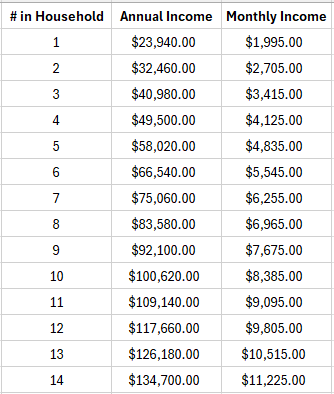United Way of Greater Philadelphia and Southern New Jersey
We are currently accepting applications for the following grant opportunities:
- PECO Customer Relief Fund - opening Monday, March 2
At United Way, we’re dedicated to one unshakable principle – no one should have to live in poverty. But right now, thousands of families in Greater Philadelphia and Southern New Jersey are living below the poverty line. This is completely unacceptable. It’s also solvable. We can erase poverty for good. But only if we stand united.
Submittable Overview
- You will need to create a free Submittable account to submit an application.
- Submittable works best with the latest versions of Chrome, Firefox, and Safari. Internet Explorer is not supported. Contact your agency's help desk or IT department if you need assistance installing a supported web browser.
- You may save a draft of your application and submit at a later date. Applications not submitted by the deadline will not be considered.
- You may invite other people to collaborate with you on an application if others from your agency need to review or enter information. Collaborators cannot submit applications. Please make sure you submit your application by the deadline.
- You will receive email notifications from Submittable about the status of your application. These emails will be sent to the email address you entered when creating your Submittable account. Please add Submittable to your safe senders list to ensure you receive these emails. Contact your agency's help desk or IT department if you need assistance with this process.
- Video demonstration: create an account and submit an application
- Visit the Submittable Help Center for videos, articles, and answers to common questions.
- Contact the Submittable Help Desk for technical support.
Program Overview
We understand any change in your living expenses can be challenging to manage. That’s why, beginning March 2, 2026, customers will be able to apply for assistance through our temporary PECO Customer Relief Fund (CRF). This will be a $2.5 million fund to provide eligible PECO customers relief in the form of credits to their heating and cooling bills, including electricity and natural gas.
- Qualifying customers will receive a grant of $750
- Grants will appear in qualifying customers’ bills as credits
The PECO Customer Relief Fund is possible through a one-time charitable contribution by Exelon, PECO's parent company, to the United Way of Greater Philadelphia and Southern New Jersey and is designed to support limited to middle-income customers. We realize customers are bearing the brunt of increasing energy costs as demand rises while supply is limited. Although PECO and Exelon do not control energy supply costs, the company is committed to advocating for customers and working to find solutions with those who do control those costs.
Eligibility Criteria
The PECO Customer Relief Fund will be available to eligible limited to middle-income households located in the PECO service area. To qualify for the CRF program, applicants must meet the following conditions:
- Be a current PECO residential electric and/or natural gas customer
- Have a household annual income between 0% and 150% of the Federal Poverty Level (FPL)
- Have a past-due balance of any amount
- Have no theft-of-service charges on the PECO account in the past 12 months
2026 Federal Poverty Level (FPL) Income Guidelines
To qualify for the PECO Customer Relief Fund, your household income must be less than or equal to these amounts:

Note: Customers with annual household incomes of 150% FPL and below may qualify for other financial assistance programs from PECO. Visit peco.com/help for further information.
- Applying for this program does not prevent disconnection of service if the amount of funds does not satisfy your outstanding balance. We encourage customers to continue to pay their PECO bill during the application process
- If your electricity has already been shut off, applying for this program does not guarantee reconnection
- Submitting an application does not guarantee that you will receive financial assistance
- Income documentation is required
- You must be receiving a separate PECO bill from your rent statement
How to Apply
- The program will be available from March 2, 2026, until available funds are exhausted.
- Applications will be online and will be processed in the order in which they are received. First come, first served.
- Response times may vary depending on the volume of submissions and the verification process. If approved, customers can expect the grant to be applied to their account in approximately one to two billing cycles from approval date.
- Visit this webpage starting March 2, 2026, for a link to the online application
PECO would like to thank the United Way of Greater Philadelphia & Southern New Jersey, along with the following community partners, for their invaluable support of the Customer Relief Fund program. Further information about the program and participating organizations is available on the United Way website.
- ACLAMO
- Open Hearth, Inc.
- United Way of Bucks County
- Community Action Agency of Delaware County, Inc. (CAADC)
- Campaign for Working Families
- Cambodian Association of Greater Philadelphia (CAGP)
- Greater Philadelphia Community Alliance (GPCA)
- YWCA Tri-County Area
Committed to Assistance Year-Round
The Customer Relief Fund is a new and one-time program in addition to PECO’s existing efforts to make energy affordable and to help customers manage their bills. Customers can visit peco.com/help for more ways to manage their bill, use energy more efficiently, or access energy assistance. This includes:
- PECO’s self-service Assistance Finder, which provides simple and personalized recommendations
- Payment arrangements and due-date extensions. For extenuating circumstances needing payment arrangements beyond 12 months, please call PECO at 1-800-494-4000
- Budget billing information and online self-serve sign-up for customers who prefer a predictable monthly bill that spreads energy costs throughout the year
